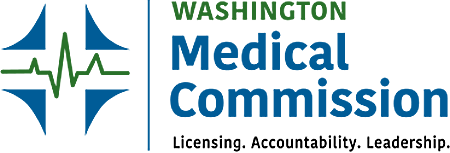Pain Management Resources
Resources and Guidance for Practitioners and Pain Patients Following a Practitioner Restriction
The Washington Medical Commission (WMC) anticipates a potential increase in patients seeking medications, including those used to treat chronic pain, and new healthcare providers, due to a recent practitioner restriction. Please read the guidance announcement for direction and resources for both practitioners and patients.
-
Electronic Prescribing and EHR/PMP Integration Mandate
Washington State law mandates all health care practitioners communicate prescriptions and prescription refills for Schedule II-V controlled substances to the pharmacy electronically.
Washington State law requires all facilities, entities, offices, or provider groups with ten(10) or more prescribers using a federally certified electronic health records (EHR) system to demonstrate that EHR system is able to fully integrate data to and from the prescription monitoring program using a mechanism approved by the Department of Health.
The law also allows the department to grant practitioners a waiver from complying with the mandate under certain circumstances. More information and attestation forms can be found on the DOH website.
-
CDC Key Clarification on Guideline for Prescribing Opioids for Chronic Pain
“The Guideline is not intended to deny any patients who suffer with chronic pain from opioid therapy as an option for pain management. Rather, the Guideline is intended to ensure that clinicians and patients consider all safe and effective treatment options for patients. Clinical decision-making should be based on the relationship between the clinician and patient, with an understanding of the patient's clinical situation, functioning, and life context, as well as a careful consideration of the benefits and risk of all treatment options, including opioid therapy. CDC encourages physicians to continue to use their clinical judgment and base treatment on what they know about their patients, including the use of opioids if determined to be the best course of treatment. Providers should communicate frequently with their patients to discuss both the benefits and risks of opioid therapy and revisit treatment plans for pain regularly to achieve the most positive outcomes for patients.”
Read the full letter from the CDC here. Read the press release from the American Society of Hematology here.
-
Washington Clarification Letter on 2017 Opioid Rules
Washington State Boards, Commissions and the Department of Health have composed a letter to clarify the 2017 opioid prescribing rules. We have received reports of patients on chronic opioid therapy whose opioids have been rapidly tapered or discontinued. We are also hearing reports of patients on chronic opioid therapy who are unable to find providers willing to care for them. The purpose of this letter is to help you better understand the existing rules around prescribing opioids and managing existing patients on chronic opioid therapy so that you feel comfortable continuing to care for these individuals. Read the letter in its entirety here and contact us if you have any questions. *This letter contains links that are no longer valid. The letter will remain as written and below are the updated links.
- The new link to the "new opioid prescribing rules" on page 2
- The new link to the "contact your appropriate board or commission: on page 3 in the last paragraph
- Under "additional resources" at the bottom of page 2, the CDC link is no longer valid because this information is included in the 2022 Clinical Practice Guideline for Prescribing Opioids for Pain.
Opioid Rules Resources
-
Full Rules for Physicians include WAC 246-919-850 through 246-919-985
-
Full Rules for Physician Assistants include WAC 246-918-800 through 246-918-935
-
Handouts that meet the requirement of WAC 246-919-865 and WAC 246-918-815 are located on the DOH site under Public/Patient
-
New Rules for Opioid Prescribing and Monitoring presentation
-
Important Information about the Prescription Monitoring Program (PMP)
-
Other Professional Resources
EXTRA! EXTRA! Read All About It!
The Medical Commission has created a special set of resources specifically about opioids and the changes that will occur as a result of 1427. Read the full version here.
- Medical Commission Chair Response to the New Opioid Rules
- Changes to Opioid Prescribing and Monitoring One Sheet
- Important Information about the Prescription Monitoring Program
- Opioid Rules FAQ
- Program Manager Words of Wisdom
Sign up to receive updates on rulemaking delivered to your inbox. You can follow us on Facebook and Twitter to receive news as it happens.
We encourage you to send us specific questions on the pain management rules for physicians and physician assistants.
Opioid Speaker Request
If you are part of a health care organization, hospital, association or patient group, request an educational presentation for your organization through the Medical Commission Speaker's Bureau



